Strategic Management: Corporate Strategy in Hospitality Sector
VerifiedAdded on 2023/06/12
|12
|3812
|66
Report
AI Summary
This report delves into the principles and models of strategic management within the hospitality industry, emphasizing the importance of strategic decisions for achieving corporate objectives. It explores the challenges faced in implementing corporate strategies across various sectors of hospitality, such as travel, tourism, resorts, and restaurants, and highlights the need for competitive strategies to enhance performance and brand recognition. The report analyzes how corporate strategies, as part of strategic management, integrate values, ethics, employee engagement, and overall company objectives to improve organizational management and customer service. It discusses the application of strategic models like the BCG growth Matrix, PESTLE, and Porter's Five Forces to aid decision-making and policy formulation, using examples such as Holiday Inn and Intercontinental Hotels to illustrate successful strategy implementation and adaptation to market dynamics. The report also touches on the significance of environmental responsibility and core competencies in maintaining a competitive edge and meeting customer demands, ultimately aiming to provide a comprehensive understanding of how corporate strategy links with strategic management for global hospitality operations.
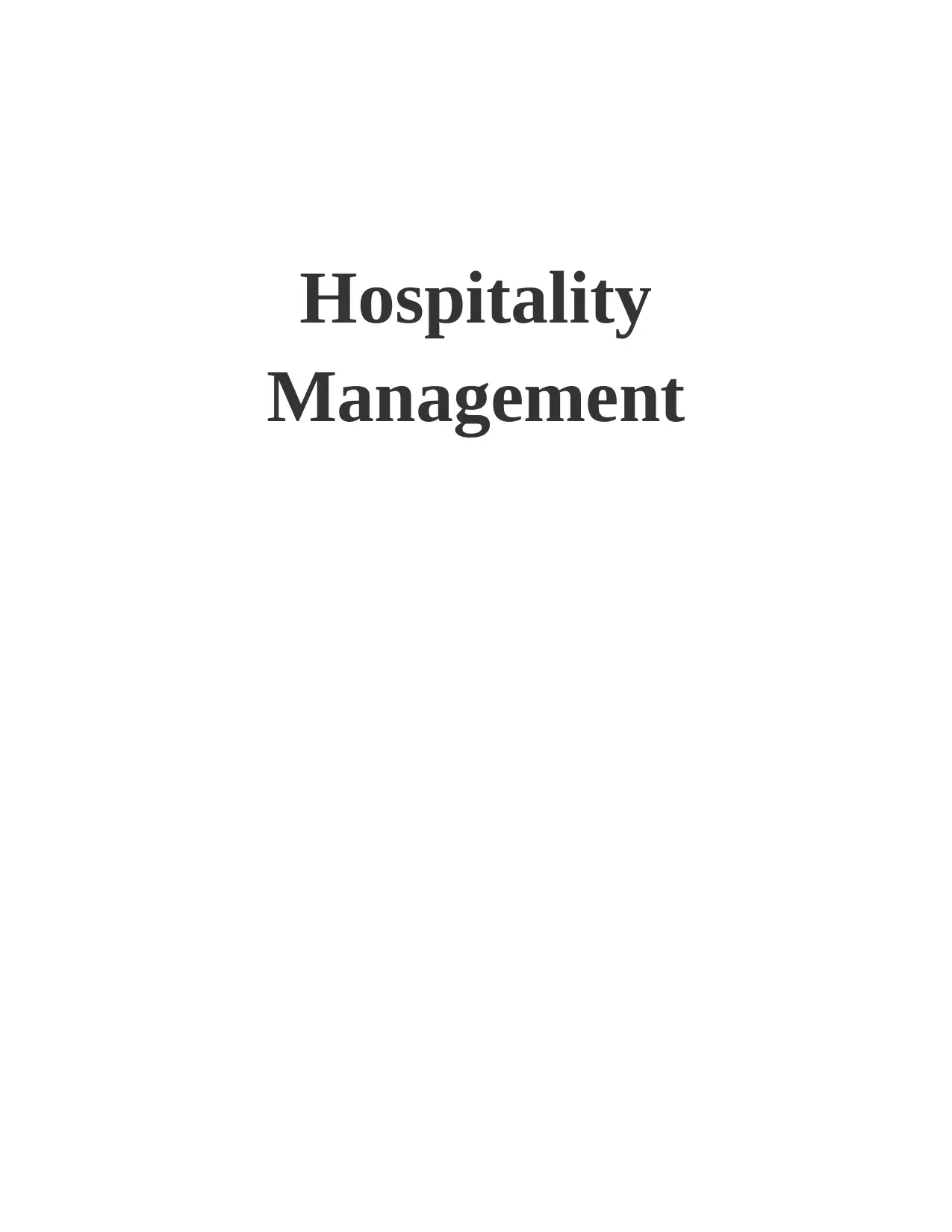
Hospitality
Management
Management
Paraphrase This Document
Need a fresh take? Get an instant paraphrase of this document with our AI Paraphraser
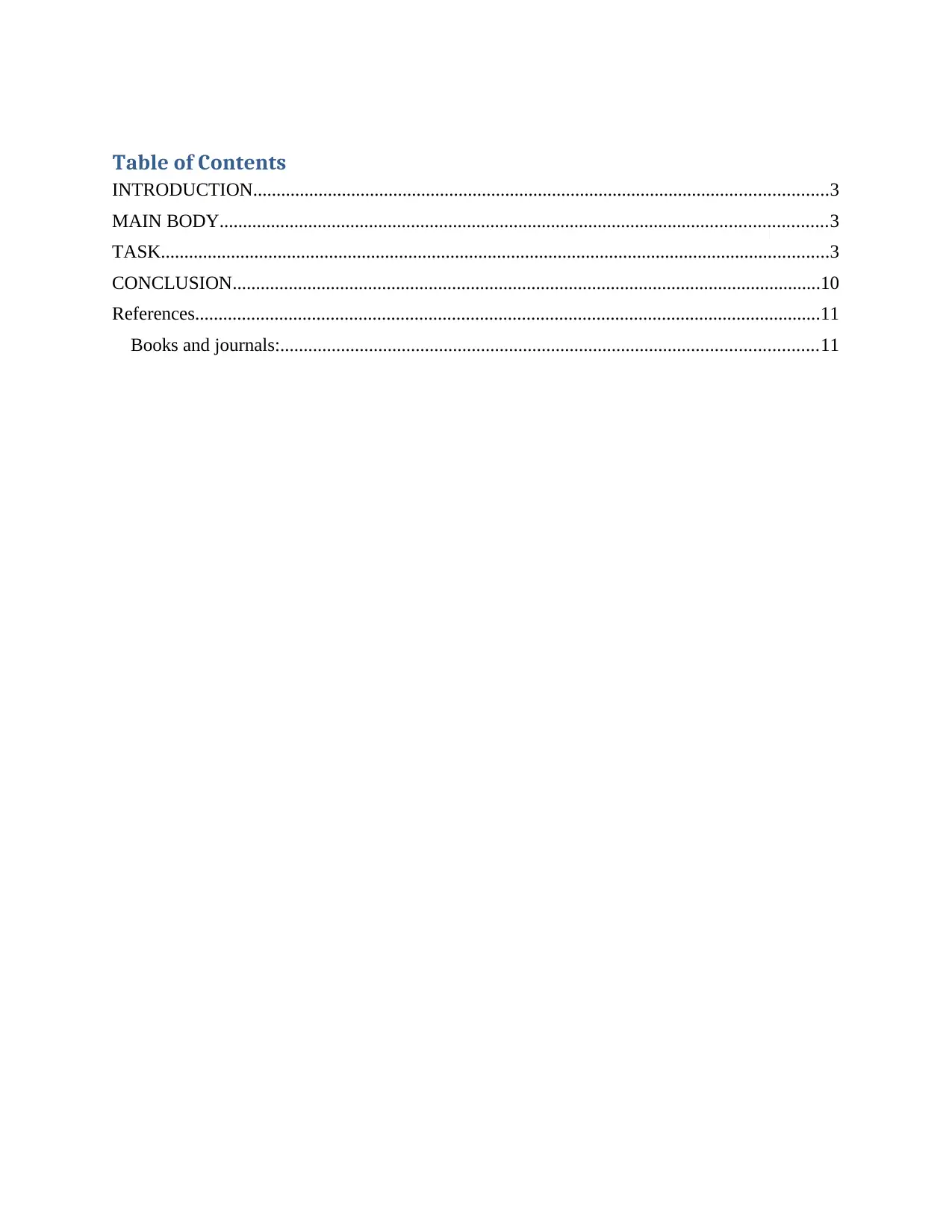
Table of Contents
INTRODUCTION...........................................................................................................................3
MAIN BODY..................................................................................................................................3
TASK...............................................................................................................................................3
CONCLUSION..............................................................................................................................10
References......................................................................................................................................11
Books and journals:...................................................................................................................11
INTRODUCTION...........................................................................................................................3
MAIN BODY..................................................................................................................................3
TASK...............................................................................................................................................3
CONCLUSION..............................................................................................................................10
References......................................................................................................................................11
Books and journals:...................................................................................................................11
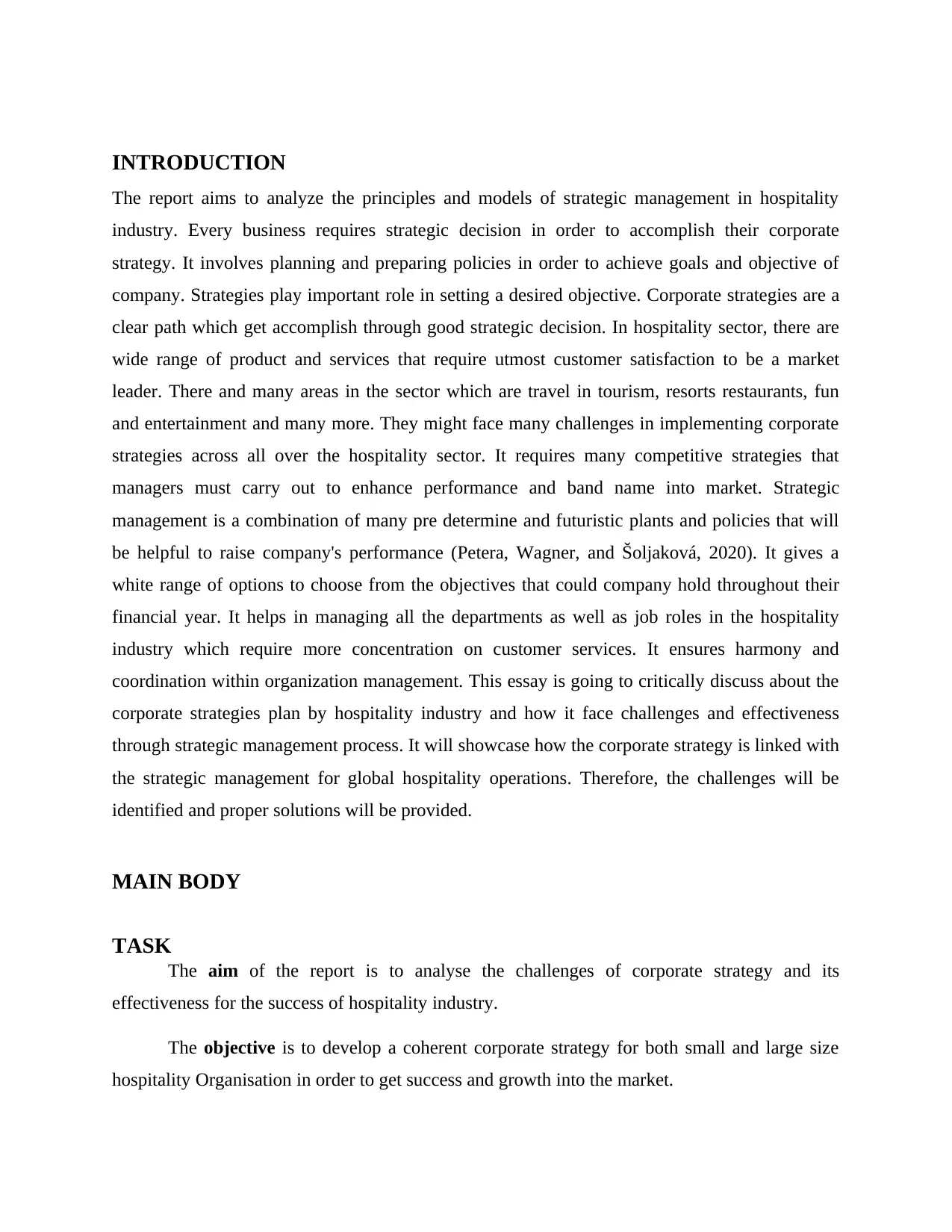
INTRODUCTION
The report aims to analyze the principles and models of strategic management in hospitality
industry. Every business requires strategic decision in order to accomplish their corporate
strategy. It involves planning and preparing policies in order to achieve goals and objective of
company. Strategies play important role in setting a desired objective. Corporate strategies are a
clear path which get accomplish through good strategic decision. In hospitality sector, there are
wide range of product and services that require utmost customer satisfaction to be a market
leader. There and many areas in the sector which are travel in tourism, resorts restaurants, fun
and entertainment and many more. They might face many challenges in implementing corporate
strategies across all over the hospitality sector. It requires many competitive strategies that
managers must carry out to enhance performance and band name into market. Strategic
management is a combination of many pre determine and futuristic plants and policies that will
be helpful to raise company's performance (Petera, Wagner, and Šoljaková, 2020). It gives a
white range of options to choose from the objectives that could company hold throughout their
financial year. It helps in managing all the departments as well as job roles in the hospitality
industry which require more concentration on customer services. It ensures harmony and
coordination within organization management. This essay is going to critically discuss about the
corporate strategies plan by hospitality industry and how it face challenges and effectiveness
through strategic management process. It will showcase how the corporate strategy is linked with
the strategic management for global hospitality operations. Therefore, the challenges will be
identified and proper solutions will be provided.
MAIN BODY
TASK
The aim of the report is to analyse the challenges of corporate strategy and its
effectiveness for the success of hospitality industry.
The objective is to develop a coherent corporate strategy for both small and large size
hospitality Organisation in order to get success and growth into the market.
The report aims to analyze the principles and models of strategic management in hospitality
industry. Every business requires strategic decision in order to accomplish their corporate
strategy. It involves planning and preparing policies in order to achieve goals and objective of
company. Strategies play important role in setting a desired objective. Corporate strategies are a
clear path which get accomplish through good strategic decision. In hospitality sector, there are
wide range of product and services that require utmost customer satisfaction to be a market
leader. There and many areas in the sector which are travel in tourism, resorts restaurants, fun
and entertainment and many more. They might face many challenges in implementing corporate
strategies across all over the hospitality sector. It requires many competitive strategies that
managers must carry out to enhance performance and band name into market. Strategic
management is a combination of many pre determine and futuristic plants and policies that will
be helpful to raise company's performance (Petera, Wagner, and Šoljaková, 2020). It gives a
white range of options to choose from the objectives that could company hold throughout their
financial year. It helps in managing all the departments as well as job roles in the hospitality
industry which require more concentration on customer services. It ensures harmony and
coordination within organization management. This essay is going to critically discuss about the
corporate strategies plan by hospitality industry and how it face challenges and effectiveness
through strategic management process. It will showcase how the corporate strategy is linked with
the strategic management for global hospitality operations. Therefore, the challenges will be
identified and proper solutions will be provided.
MAIN BODY
TASK
The aim of the report is to analyse the challenges of corporate strategy and its
effectiveness for the success of hospitality industry.
The objective is to develop a coherent corporate strategy for both small and large size
hospitality Organisation in order to get success and growth into the market.
⊘ This is a preview!⊘
Do you want full access?
Subscribe today to unlock all pages.

Trusted by 1+ million students worldwide
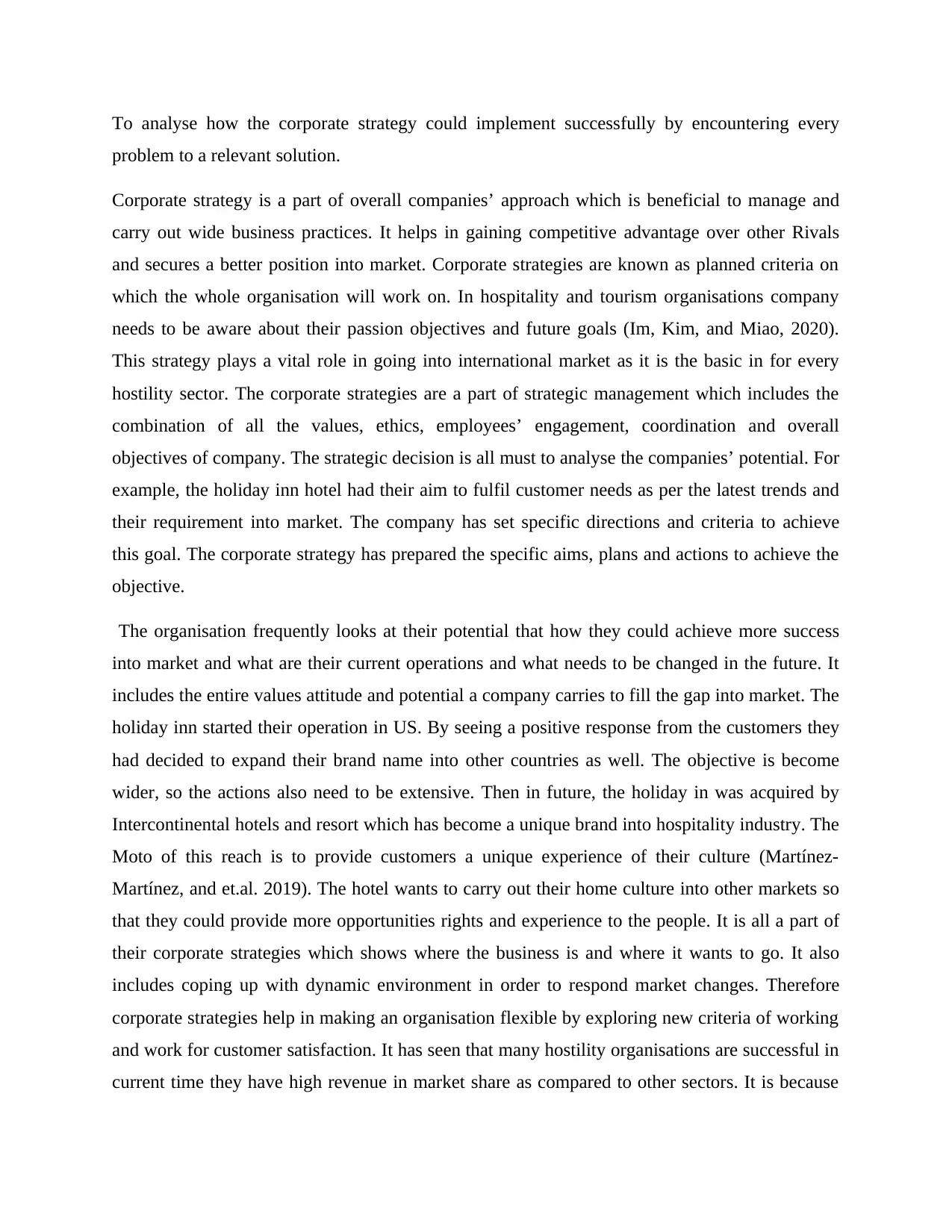
To analyse how the corporate strategy could implement successfully by encountering every
problem to a relevant solution.
Corporate strategy is a part of overall companies’ approach which is beneficial to manage and
carry out wide business practices. It helps in gaining competitive advantage over other Rivals
and secures a better position into market. Corporate strategies are known as planned criteria on
which the whole organisation will work on. In hospitality and tourism organisations company
needs to be aware about their passion objectives and future goals (Im, Kim, and Miao, 2020).
This strategy plays a vital role in going into international market as it is the basic in for every
hostility sector. The corporate strategies are a part of strategic management which includes the
combination of all the values, ethics, employees’ engagement, coordination and overall
objectives of company. The strategic decision is all must to analyse the companies’ potential. For
example, the holiday inn hotel had their aim to fulfil customer needs as per the latest trends and
their requirement into market. The company has set specific directions and criteria to achieve
this goal. The corporate strategy has prepared the specific aims, plans and actions to achieve the
objective.
The organisation frequently looks at their potential that how they could achieve more success
into market and what are their current operations and what needs to be changed in the future. It
includes the entire values attitude and potential a company carries to fill the gap into market. The
holiday inn started their operation in US. By seeing a positive response from the customers they
had decided to expand their brand name into other countries as well. The objective is become
wider, so the actions also need to be extensive. Then in future, the holiday in was acquired by
Intercontinental hotels and resort which has become a unique brand into hospitality industry. The
Moto of this reach is to provide customers a unique experience of their culture (Martínez-
Martínez, and et.al. 2019). The hotel wants to carry out their home culture into other markets so
that they could provide more opportunities rights and experience to the people. It is all a part of
their corporate strategies which shows where the business is and where it wants to go. It also
includes coping up with dynamic environment in order to respond market changes. Therefore
corporate strategies help in making an organisation flexible by exploring new criteria of working
and work for customer satisfaction. It has seen that many hostility organisations are successful in
current time they have high revenue in market share as compared to other sectors. It is because
problem to a relevant solution.
Corporate strategy is a part of overall companies’ approach which is beneficial to manage and
carry out wide business practices. It helps in gaining competitive advantage over other Rivals
and secures a better position into market. Corporate strategies are known as planned criteria on
which the whole organisation will work on. In hospitality and tourism organisations company
needs to be aware about their passion objectives and future goals (Im, Kim, and Miao, 2020).
This strategy plays a vital role in going into international market as it is the basic in for every
hostility sector. The corporate strategies are a part of strategic management which includes the
combination of all the values, ethics, employees’ engagement, coordination and overall
objectives of company. The strategic decision is all must to analyse the companies’ potential. For
example, the holiday inn hotel had their aim to fulfil customer needs as per the latest trends and
their requirement into market. The company has set specific directions and criteria to achieve
this goal. The corporate strategy has prepared the specific aims, plans and actions to achieve the
objective.
The organisation frequently looks at their potential that how they could achieve more success
into market and what are their current operations and what needs to be changed in the future. It
includes the entire values attitude and potential a company carries to fill the gap into market. The
holiday inn started their operation in US. By seeing a positive response from the customers they
had decided to expand their brand name into other countries as well. The objective is become
wider, so the actions also need to be extensive. Then in future, the holiday in was acquired by
Intercontinental hotels and resort which has become a unique brand into hospitality industry. The
Moto of this reach is to provide customers a unique experience of their culture (Martínez-
Martínez, and et.al. 2019). The hotel wants to carry out their home culture into other markets so
that they could provide more opportunities rights and experience to the people. It is all a part of
their corporate strategies which shows where the business is and where it wants to go. It also
includes coping up with dynamic environment in order to respond market changes. Therefore
corporate strategies help in making an organisation flexible by exploring new criteria of working
and work for customer satisfaction. It has seen that many hostility organisations are successful in
current time they have high revenue in market share as compared to other sectors. It is because
Paraphrase This Document
Need a fresh take? Get an instant paraphrase of this document with our AI Paraphraser
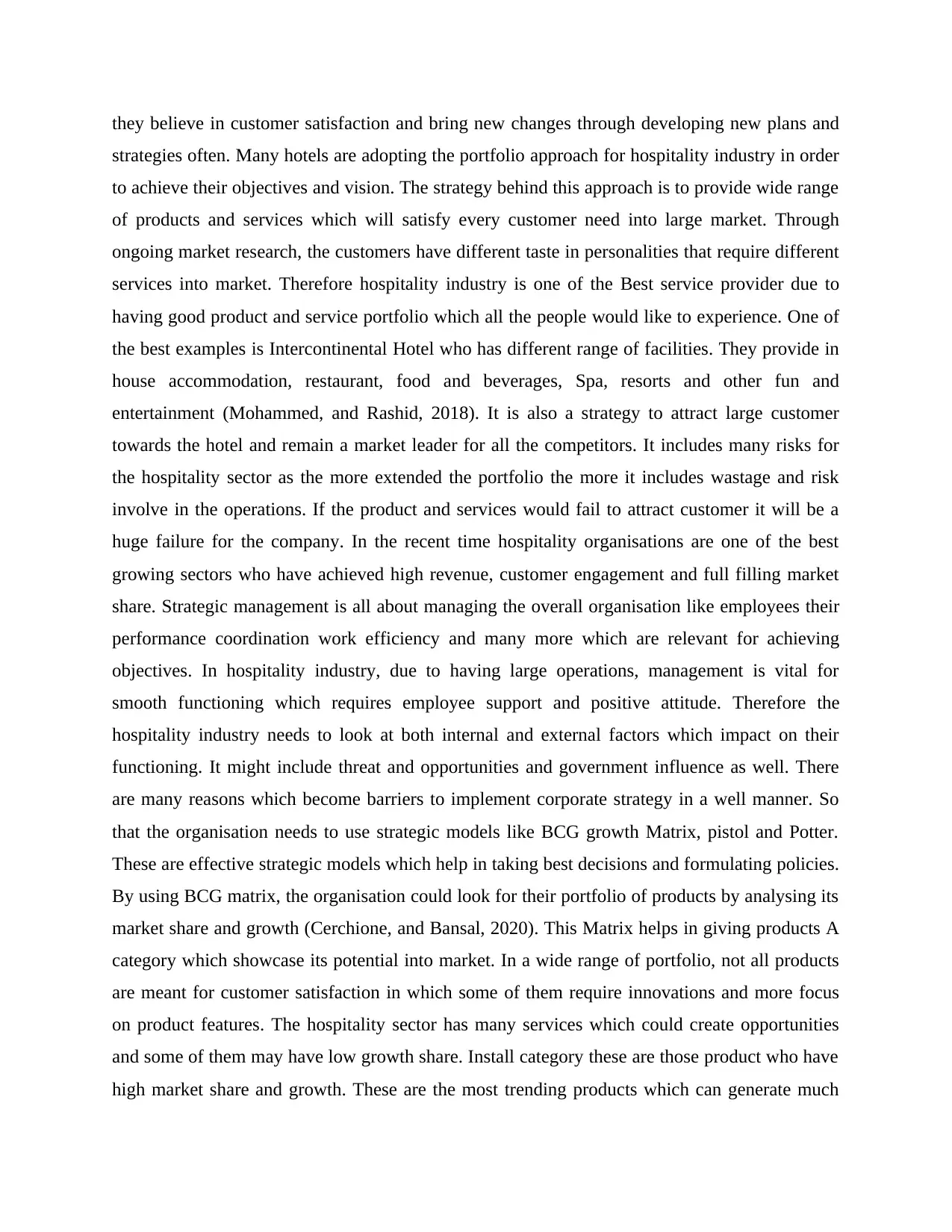
they believe in customer satisfaction and bring new changes through developing new plans and
strategies often. Many hotels are adopting the portfolio approach for hospitality industry in order
to achieve their objectives and vision. The strategy behind this approach is to provide wide range
of products and services which will satisfy every customer need into large market. Through
ongoing market research, the customers have different taste in personalities that require different
services into market. Therefore hospitality industry is one of the Best service provider due to
having good product and service portfolio which all the people would like to experience. One of
the best examples is Intercontinental Hotel who has different range of facilities. They provide in
house accommodation, restaurant, food and beverages, Spa, resorts and other fun and
entertainment (Mohammed, and Rashid, 2018). It is also a strategy to attract large customer
towards the hotel and remain a market leader for all the competitors. It includes many risks for
the hospitality sector as the more extended the portfolio the more it includes wastage and risk
involve in the operations. If the product and services would fail to attract customer it will be a
huge failure for the company. In the recent time hospitality organisations are one of the best
growing sectors who have achieved high revenue, customer engagement and full filling market
share. Strategic management is all about managing the overall organisation like employees their
performance coordination work efficiency and many more which are relevant for achieving
objectives. In hospitality industry, due to having large operations, management is vital for
smooth functioning which requires employee support and positive attitude. Therefore the
hospitality industry needs to look at both internal and external factors which impact on their
functioning. It might include threat and opportunities and government influence as well. There
are many reasons which become barriers to implement corporate strategy in a well manner. So
that the organisation needs to use strategic models like BCG growth Matrix, pistol and Potter.
These are effective strategic models which help in taking best decisions and formulating policies.
By using BCG matrix, the organisation could look for their portfolio of products by analysing its
market share and growth (Cerchione, and Bansal, 2020). This Matrix helps in giving products A
category which showcase its potential into market. In a wide range of portfolio, not all products
are meant for customer satisfaction in which some of them require innovations and more focus
on product features. The hospitality sector has many services which could create opportunities
and some of them may have low growth share. Install category these are those product who have
high market share and growth. These are the most trending products which can generate much
strategies often. Many hotels are adopting the portfolio approach for hospitality industry in order
to achieve their objectives and vision. The strategy behind this approach is to provide wide range
of products and services which will satisfy every customer need into large market. Through
ongoing market research, the customers have different taste in personalities that require different
services into market. Therefore hospitality industry is one of the Best service provider due to
having good product and service portfolio which all the people would like to experience. One of
the best examples is Intercontinental Hotel who has different range of facilities. They provide in
house accommodation, restaurant, food and beverages, Spa, resorts and other fun and
entertainment (Mohammed, and Rashid, 2018). It is also a strategy to attract large customer
towards the hotel and remain a market leader for all the competitors. It includes many risks for
the hospitality sector as the more extended the portfolio the more it includes wastage and risk
involve in the operations. If the product and services would fail to attract customer it will be a
huge failure for the company. In the recent time hospitality organisations are one of the best
growing sectors who have achieved high revenue, customer engagement and full filling market
share. Strategic management is all about managing the overall organisation like employees their
performance coordination work efficiency and many more which are relevant for achieving
objectives. In hospitality industry, due to having large operations, management is vital for
smooth functioning which requires employee support and positive attitude. Therefore the
hospitality industry needs to look at both internal and external factors which impact on their
functioning. It might include threat and opportunities and government influence as well. There
are many reasons which become barriers to implement corporate strategy in a well manner. So
that the organisation needs to use strategic models like BCG growth Matrix, pistol and Potter.
These are effective strategic models which help in taking best decisions and formulating policies.
By using BCG matrix, the organisation could look for their portfolio of products by analysing its
market share and growth (Cerchione, and Bansal, 2020). This Matrix helps in giving products A
category which showcase its potential into market. In a wide range of portfolio, not all products
are meant for customer satisfaction in which some of them require innovations and more focus
on product features. The hospitality sector has many services which could create opportunities
and some of them may have low growth share. Install category these are those product who have
high market share and growth. These are the most trending products which can generate much
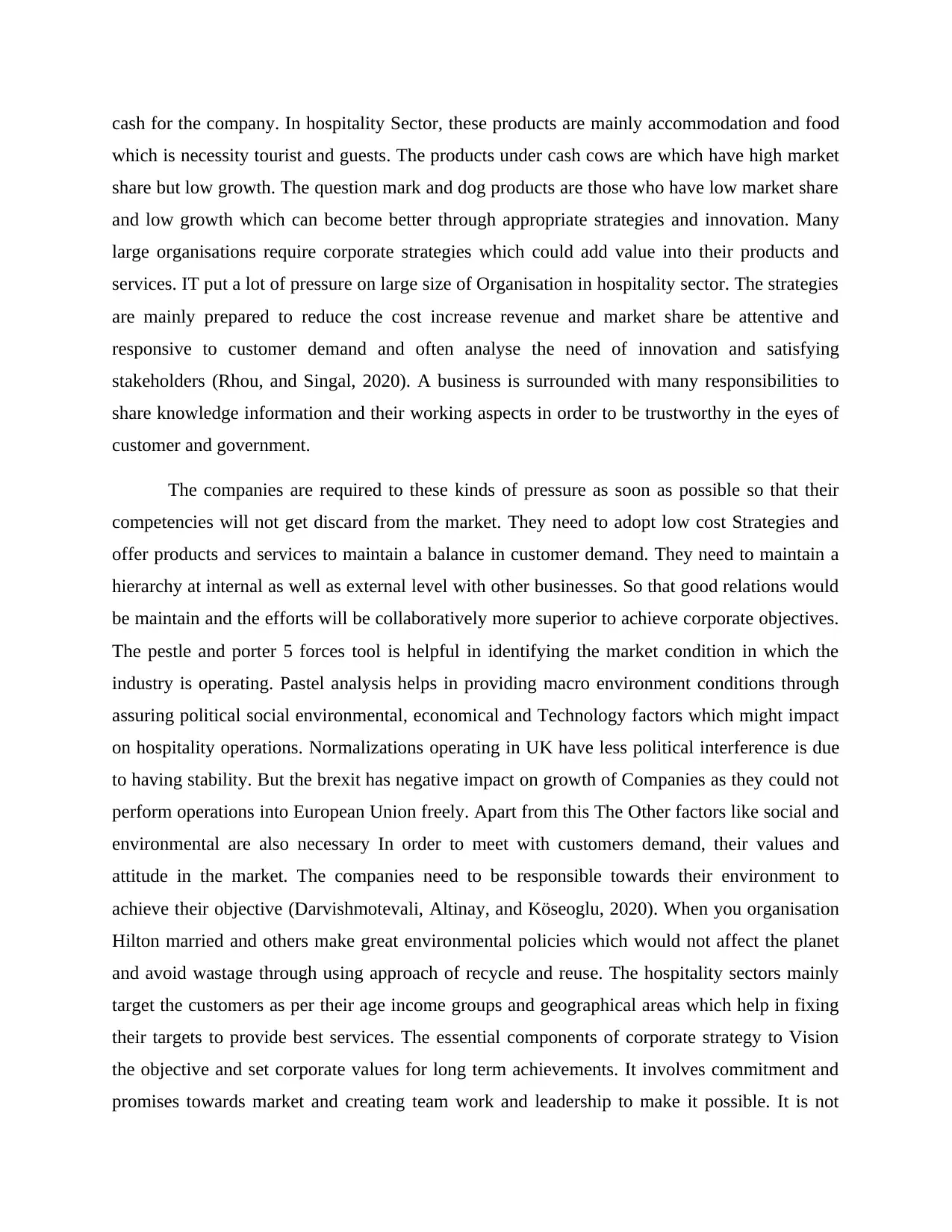
cash for the company. In hospitality Sector, these products are mainly accommodation and food
which is necessity tourist and guests. The products under cash cows are which have high market
share but low growth. The question mark and dog products are those who have low market share
and low growth which can become better through appropriate strategies and innovation. Many
large organisations require corporate strategies which could add value into their products and
services. IT put a lot of pressure on large size of Organisation in hospitality sector. The strategies
are mainly prepared to reduce the cost increase revenue and market share be attentive and
responsive to customer demand and often analyse the need of innovation and satisfying
stakeholders (Rhou, and Singal, 2020). A business is surrounded with many responsibilities to
share knowledge information and their working aspects in order to be trustworthy in the eyes of
customer and government.
The companies are required to these kinds of pressure as soon as possible so that their
competencies will not get discard from the market. They need to adopt low cost Strategies and
offer products and services to maintain a balance in customer demand. They need to maintain a
hierarchy at internal as well as external level with other businesses. So that good relations would
be maintain and the efforts will be collaboratively more superior to achieve corporate objectives.
The pestle and porter 5 forces tool is helpful in identifying the market condition in which the
industry is operating. Pastel analysis helps in providing macro environment conditions through
assuring political social environmental, economical and Technology factors which might impact
on hospitality operations. Normalizations operating in UK have less political interference is due
to having stability. But the brexit has negative impact on growth of Companies as they could not
perform operations into European Union freely. Apart from this The Other factors like social and
environmental are also necessary In order to meet with customers demand, their values and
attitude in the market. The companies need to be responsible towards their environment to
achieve their objective (Darvishmotevali, Altinay, and Köseoglu, 2020). When you organisation
Hilton married and others make great environmental policies which would not affect the planet
and avoid wastage through using approach of recycle and reuse. The hospitality sectors mainly
target the customers as per their age income groups and geographical areas which help in fixing
their targets to provide best services. The essential components of corporate strategy to Vision
the objective and set corporate values for long term achievements. It involves commitment and
promises towards market and creating team work and leadership to make it possible. It is not
which is necessity tourist and guests. The products under cash cows are which have high market
share but low growth. The question mark and dog products are those who have low market share
and low growth which can become better through appropriate strategies and innovation. Many
large organisations require corporate strategies which could add value into their products and
services. IT put a lot of pressure on large size of Organisation in hospitality sector. The strategies
are mainly prepared to reduce the cost increase revenue and market share be attentive and
responsive to customer demand and often analyse the need of innovation and satisfying
stakeholders (Rhou, and Singal, 2020). A business is surrounded with many responsibilities to
share knowledge information and their working aspects in order to be trustworthy in the eyes of
customer and government.
The companies are required to these kinds of pressure as soon as possible so that their
competencies will not get discard from the market. They need to adopt low cost Strategies and
offer products and services to maintain a balance in customer demand. They need to maintain a
hierarchy at internal as well as external level with other businesses. So that good relations would
be maintain and the efforts will be collaboratively more superior to achieve corporate objectives.
The pestle and porter 5 forces tool is helpful in identifying the market condition in which the
industry is operating. Pastel analysis helps in providing macro environment conditions through
assuring political social environmental, economical and Technology factors which might impact
on hospitality operations. Normalizations operating in UK have less political interference is due
to having stability. But the brexit has negative impact on growth of Companies as they could not
perform operations into European Union freely. Apart from this The Other factors like social and
environmental are also necessary In order to meet with customers demand, their values and
attitude in the market. The companies need to be responsible towards their environment to
achieve their objective (Darvishmotevali, Altinay, and Köseoglu, 2020). When you organisation
Hilton married and others make great environmental policies which would not affect the planet
and avoid wastage through using approach of recycle and reuse. The hospitality sectors mainly
target the customers as per their age income groups and geographical areas which help in fixing
their targets to provide best services. The essential components of corporate strategy to Vision
the objective and set corporate values for long term achievements. It involves commitment and
promises towards market and creating team work and leadership to make it possible. It is not
⊘ This is a preview!⊘
Do you want full access?
Subscribe today to unlock all pages.

Trusted by 1+ million students worldwide
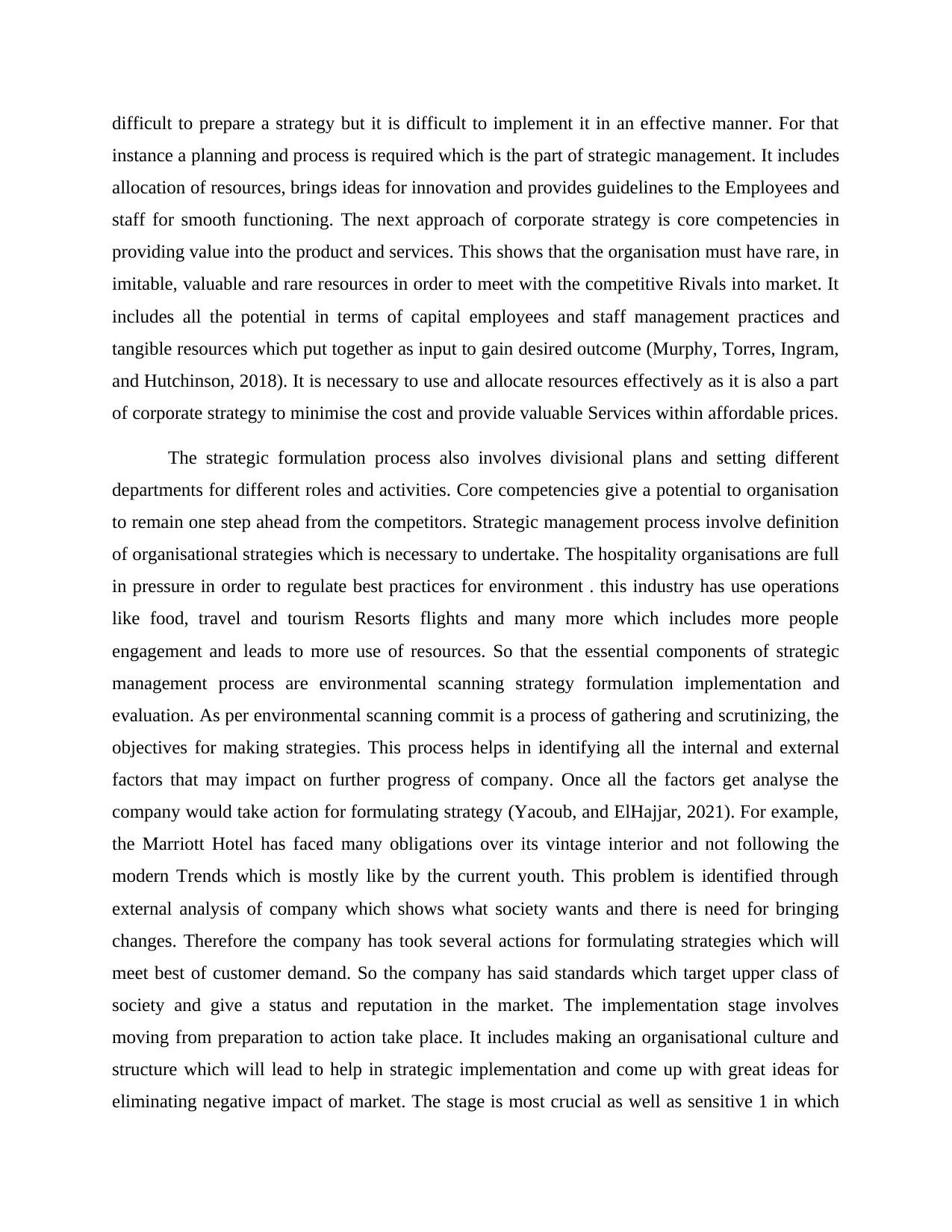
difficult to prepare a strategy but it is difficult to implement it in an effective manner. For that
instance a planning and process is required which is the part of strategic management. It includes
allocation of resources, brings ideas for innovation and provides guidelines to the Employees and
staff for smooth functioning. The next approach of corporate strategy is core competencies in
providing value into the product and services. This shows that the organisation must have rare, in
imitable, valuable and rare resources in order to meet with the competitive Rivals into market. It
includes all the potential in terms of capital employees and staff management practices and
tangible resources which put together as input to gain desired outcome (Murphy, Torres, Ingram,
and Hutchinson, 2018). It is necessary to use and allocate resources effectively as it is also a part
of corporate strategy to minimise the cost and provide valuable Services within affordable prices.
The strategic formulation process also involves divisional plans and setting different
departments for different roles and activities. Core competencies give a potential to organisation
to remain one step ahead from the competitors. Strategic management process involve definition
of organisational strategies which is necessary to undertake. The hospitality organisations are full
in pressure in order to regulate best practices for environment . this industry has use operations
like food, travel and tourism Resorts flights and many more which includes more people
engagement and leads to more use of resources. So that the essential components of strategic
management process are environmental scanning strategy formulation implementation and
evaluation. As per environmental scanning commit is a process of gathering and scrutinizing, the
objectives for making strategies. This process helps in identifying all the internal and external
factors that may impact on further progress of company. Once all the factors get analyse the
company would take action for formulating strategy (Yacoub, and ElHajjar, 2021). For example,
the Marriott Hotel has faced many obligations over its vintage interior and not following the
modern Trends which is mostly like by the current youth. This problem is identified through
external analysis of company which shows what society wants and there is need for bringing
changes. Therefore the company has took several actions for formulating strategies which will
meet best of customer demand. So the company has said standards which target upper class of
society and give a status and reputation in the market. The implementation stage involves
moving from preparation to action take place. It includes making an organisational culture and
structure which will lead to help in strategic implementation and come up with great ideas for
eliminating negative impact of market. The stage is most crucial as well as sensitive 1 in which
instance a planning and process is required which is the part of strategic management. It includes
allocation of resources, brings ideas for innovation and provides guidelines to the Employees and
staff for smooth functioning. The next approach of corporate strategy is core competencies in
providing value into the product and services. This shows that the organisation must have rare, in
imitable, valuable and rare resources in order to meet with the competitive Rivals into market. It
includes all the potential in terms of capital employees and staff management practices and
tangible resources which put together as input to gain desired outcome (Murphy, Torres, Ingram,
and Hutchinson, 2018). It is necessary to use and allocate resources effectively as it is also a part
of corporate strategy to minimise the cost and provide valuable Services within affordable prices.
The strategic formulation process also involves divisional plans and setting different
departments for different roles and activities. Core competencies give a potential to organisation
to remain one step ahead from the competitors. Strategic management process involve definition
of organisational strategies which is necessary to undertake. The hospitality organisations are full
in pressure in order to regulate best practices for environment . this industry has use operations
like food, travel and tourism Resorts flights and many more which includes more people
engagement and leads to more use of resources. So that the essential components of strategic
management process are environmental scanning strategy formulation implementation and
evaluation. As per environmental scanning commit is a process of gathering and scrutinizing, the
objectives for making strategies. This process helps in identifying all the internal and external
factors that may impact on further progress of company. Once all the factors get analyse the
company would take action for formulating strategy (Yacoub, and ElHajjar, 2021). For example,
the Marriott Hotel has faced many obligations over its vintage interior and not following the
modern Trends which is mostly like by the current youth. This problem is identified through
external analysis of company which shows what society wants and there is need for bringing
changes. Therefore the company has took several actions for formulating strategies which will
meet best of customer demand. So the company has said standards which target upper class of
society and give a status and reputation in the market. The implementation stage involves
moving from preparation to action take place. It includes making an organisational culture and
structure which will lead to help in strategic implementation and come up with great ideas for
eliminating negative impact of market. The stage is most crucial as well as sensitive 1 in which
Paraphrase This Document
Need a fresh take? Get an instant paraphrase of this document with our AI Paraphraser
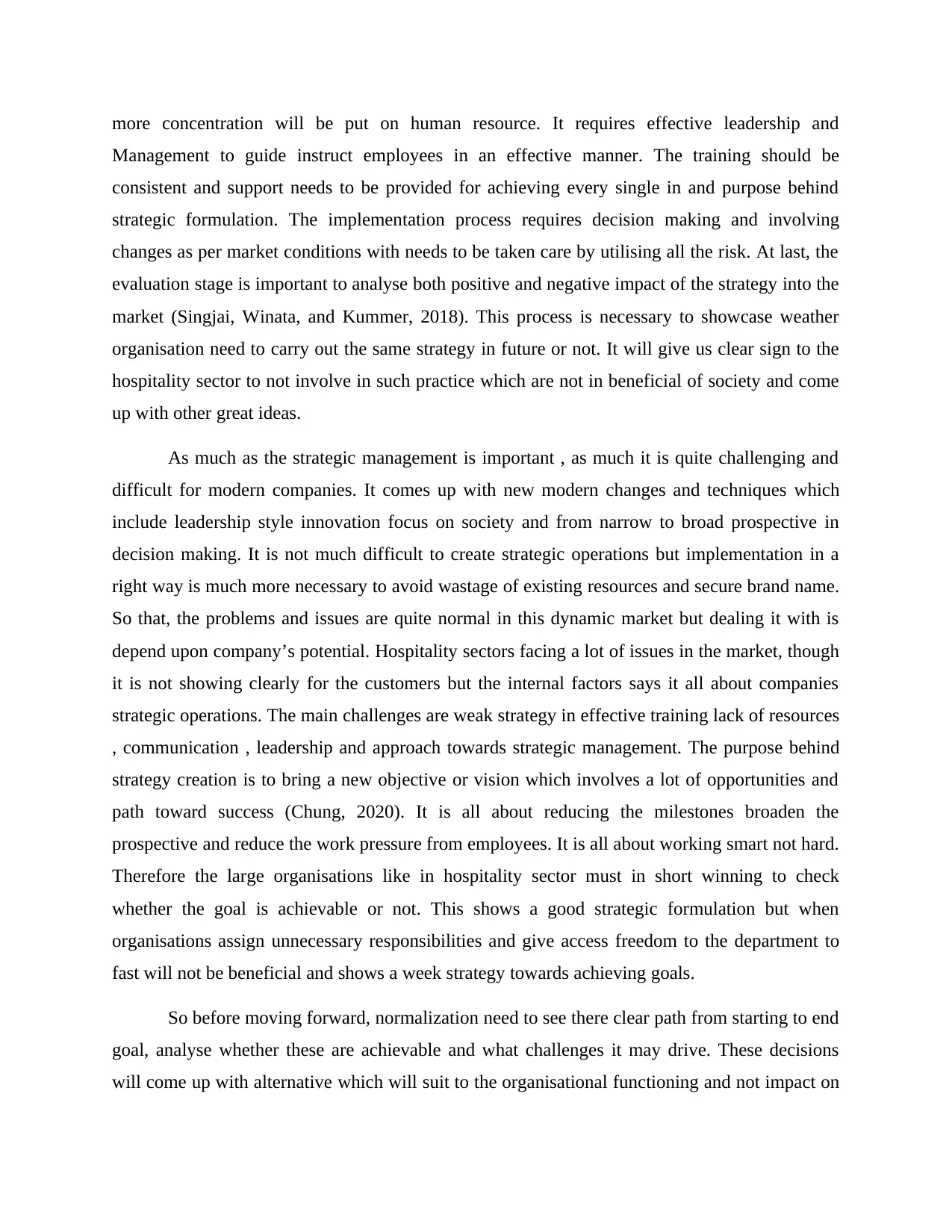
more concentration will be put on human resource. It requires effective leadership and
Management to guide instruct employees in an effective manner. The training should be
consistent and support needs to be provided for achieving every single in and purpose behind
strategic formulation. The implementation process requires decision making and involving
changes as per market conditions with needs to be taken care by utilising all the risk. At last, the
evaluation stage is important to analyse both positive and negative impact of the strategy into the
market (Singjai, Winata, and Kummer, 2018). This process is necessary to showcase weather
organisation need to carry out the same strategy in future or not. It will give us clear sign to the
hospitality sector to not involve in such practice which are not in beneficial of society and come
up with other great ideas.
As much as the strategic management is important , as much it is quite challenging and
difficult for modern companies. It comes up with new modern changes and techniques which
include leadership style innovation focus on society and from narrow to broad prospective in
decision making. It is not much difficult to create strategic operations but implementation in a
right way is much more necessary to avoid wastage of existing resources and secure brand name.
So that, the problems and issues are quite normal in this dynamic market but dealing it with is
depend upon company’s potential. Hospitality sectors facing a lot of issues in the market, though
it is not showing clearly for the customers but the internal factors says it all about companies
strategic operations. The main challenges are weak strategy in effective training lack of resources
, communication , leadership and approach towards strategic management. The purpose behind
strategy creation is to bring a new objective or vision which involves a lot of opportunities and
path toward success (Chung, 2020). It is all about reducing the milestones broaden the
prospective and reduce the work pressure from employees. It is all about working smart not hard.
Therefore the large organisations like in hospitality sector must in short winning to check
whether the goal is achievable or not. This shows a good strategic formulation but when
organisations assign unnecessary responsibilities and give access freedom to the department to
fast will not be beneficial and shows a week strategy towards achieving goals.
So before moving forward, normalization need to see there clear path from starting to end
goal, analyse whether these are achievable and what challenges it may drive. These decisions
will come up with alternative which will suit to the organisational functioning and not impact on
Management to guide instruct employees in an effective manner. The training should be
consistent and support needs to be provided for achieving every single in and purpose behind
strategic formulation. The implementation process requires decision making and involving
changes as per market conditions with needs to be taken care by utilising all the risk. At last, the
evaluation stage is important to analyse both positive and negative impact of the strategy into the
market (Singjai, Winata, and Kummer, 2018). This process is necessary to showcase weather
organisation need to carry out the same strategy in future or not. It will give us clear sign to the
hospitality sector to not involve in such practice which are not in beneficial of society and come
up with other great ideas.
As much as the strategic management is important , as much it is quite challenging and
difficult for modern companies. It comes up with new modern changes and techniques which
include leadership style innovation focus on society and from narrow to broad prospective in
decision making. It is not much difficult to create strategic operations but implementation in a
right way is much more necessary to avoid wastage of existing resources and secure brand name.
So that, the problems and issues are quite normal in this dynamic market but dealing it with is
depend upon company’s potential. Hospitality sectors facing a lot of issues in the market, though
it is not showing clearly for the customers but the internal factors says it all about companies
strategic operations. The main challenges are weak strategy in effective training lack of resources
, communication , leadership and approach towards strategic management. The purpose behind
strategy creation is to bring a new objective or vision which involves a lot of opportunities and
path toward success (Chung, 2020). It is all about reducing the milestones broaden the
prospective and reduce the work pressure from employees. It is all about working smart not hard.
Therefore the large organisations like in hospitality sector must in short winning to check
whether the goal is achievable or not. This shows a good strategic formulation but when
organisations assign unnecessary responsibilities and give access freedom to the department to
fast will not be beneficial and shows a week strategy towards achieving goals.
So before moving forward, normalization need to see there clear path from starting to end
goal, analyse whether these are achievable and what challenges it may drive. These decisions
will come up with alternative which will suit to the organisational functioning and not impact on
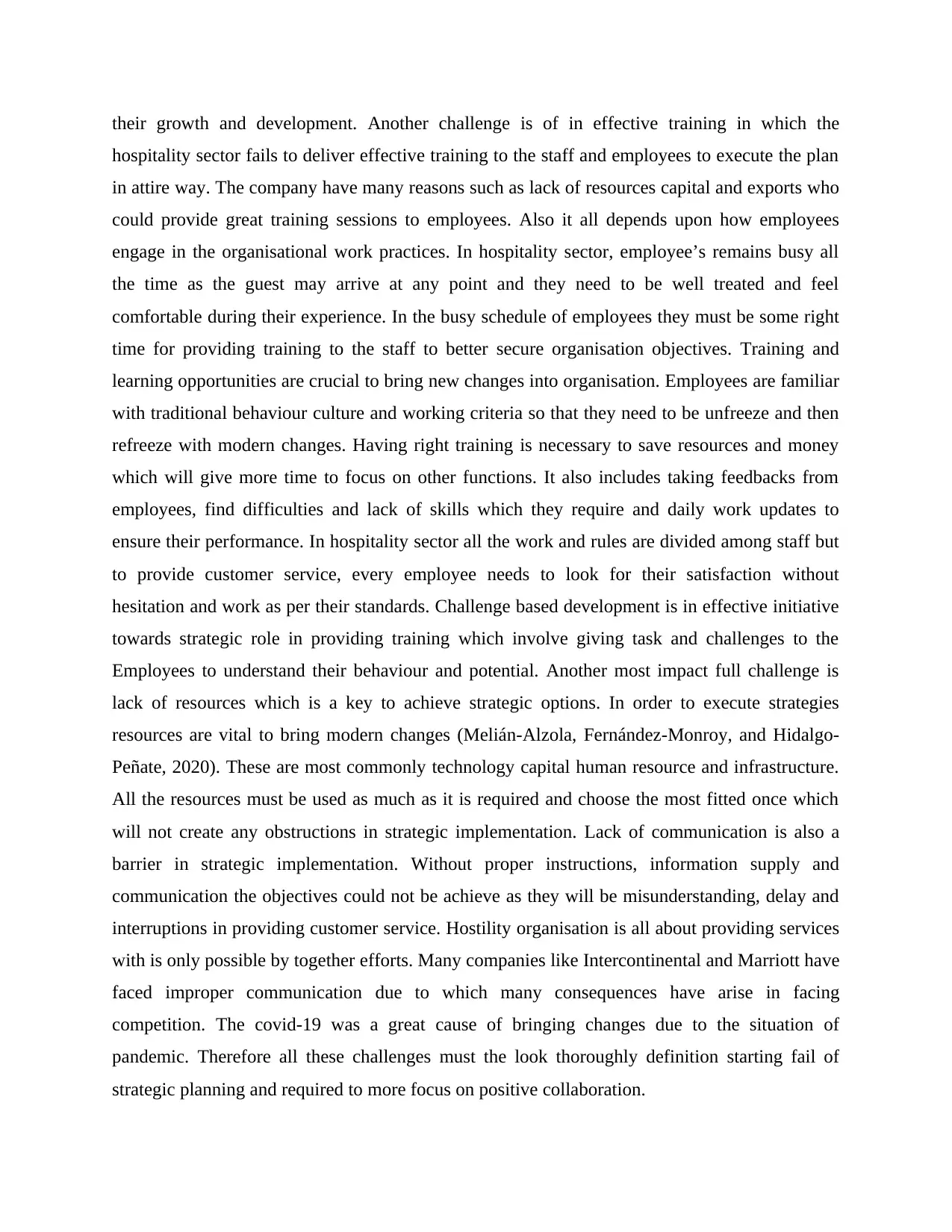
their growth and development. Another challenge is of in effective training in which the
hospitality sector fails to deliver effective training to the staff and employees to execute the plan
in attire way. The company have many reasons such as lack of resources capital and exports who
could provide great training sessions to employees. Also it all depends upon how employees
engage in the organisational work practices. In hospitality sector, employee’s remains busy all
the time as the guest may arrive at any point and they need to be well treated and feel
comfortable during their experience. In the busy schedule of employees they must be some right
time for providing training to the staff to better secure organisation objectives. Training and
learning opportunities are crucial to bring new changes into organisation. Employees are familiar
with traditional behaviour culture and working criteria so that they need to be unfreeze and then
refreeze with modern changes. Having right training is necessary to save resources and money
which will give more time to focus on other functions. It also includes taking feedbacks from
employees, find difficulties and lack of skills which they require and daily work updates to
ensure their performance. In hospitality sector all the work and rules are divided among staff but
to provide customer service, every employee needs to look for their satisfaction without
hesitation and work as per their standards. Challenge based development is in effective initiative
towards strategic role in providing training which involve giving task and challenges to the
Employees to understand their behaviour and potential. Another most impact full challenge is
lack of resources which is a key to achieve strategic options. In order to execute strategies
resources are vital to bring modern changes (Melián-Alzola, Fernández-Monroy, and Hidalgo-
Peñate, 2020). These are most commonly technology capital human resource and infrastructure.
All the resources must be used as much as it is required and choose the most fitted once which
will not create any obstructions in strategic implementation. Lack of communication is also a
barrier in strategic implementation. Without proper instructions, information supply and
communication the objectives could not be achieve as they will be misunderstanding, delay and
interruptions in providing customer service. Hostility organisation is all about providing services
with is only possible by together efforts. Many companies like Intercontinental and Marriott have
faced improper communication due to which many consequences have arise in facing
competition. The covid-19 was a great cause of bringing changes due to the situation of
pandemic. Therefore all these challenges must the look thoroughly definition starting fail of
strategic planning and required to more focus on positive collaboration.
hospitality sector fails to deliver effective training to the staff and employees to execute the plan
in attire way. The company have many reasons such as lack of resources capital and exports who
could provide great training sessions to employees. Also it all depends upon how employees
engage in the organisational work practices. In hospitality sector, employee’s remains busy all
the time as the guest may arrive at any point and they need to be well treated and feel
comfortable during their experience. In the busy schedule of employees they must be some right
time for providing training to the staff to better secure organisation objectives. Training and
learning opportunities are crucial to bring new changes into organisation. Employees are familiar
with traditional behaviour culture and working criteria so that they need to be unfreeze and then
refreeze with modern changes. Having right training is necessary to save resources and money
which will give more time to focus on other functions. It also includes taking feedbacks from
employees, find difficulties and lack of skills which they require and daily work updates to
ensure their performance. In hospitality sector all the work and rules are divided among staff but
to provide customer service, every employee needs to look for their satisfaction without
hesitation and work as per their standards. Challenge based development is in effective initiative
towards strategic role in providing training which involve giving task and challenges to the
Employees to understand their behaviour and potential. Another most impact full challenge is
lack of resources which is a key to achieve strategic options. In order to execute strategies
resources are vital to bring modern changes (Melián-Alzola, Fernández-Monroy, and Hidalgo-
Peñate, 2020). These are most commonly technology capital human resource and infrastructure.
All the resources must be used as much as it is required and choose the most fitted once which
will not create any obstructions in strategic implementation. Lack of communication is also a
barrier in strategic implementation. Without proper instructions, information supply and
communication the objectives could not be achieve as they will be misunderstanding, delay and
interruptions in providing customer service. Hostility organisation is all about providing services
with is only possible by together efforts. Many companies like Intercontinental and Marriott have
faced improper communication due to which many consequences have arise in facing
competition. The covid-19 was a great cause of bringing changes due to the situation of
pandemic. Therefore all these challenges must the look thoroughly definition starting fail of
strategic planning and required to more focus on positive collaboration.
⊘ This is a preview!⊘
Do you want full access?
Subscribe today to unlock all pages.

Trusted by 1+ million students worldwide
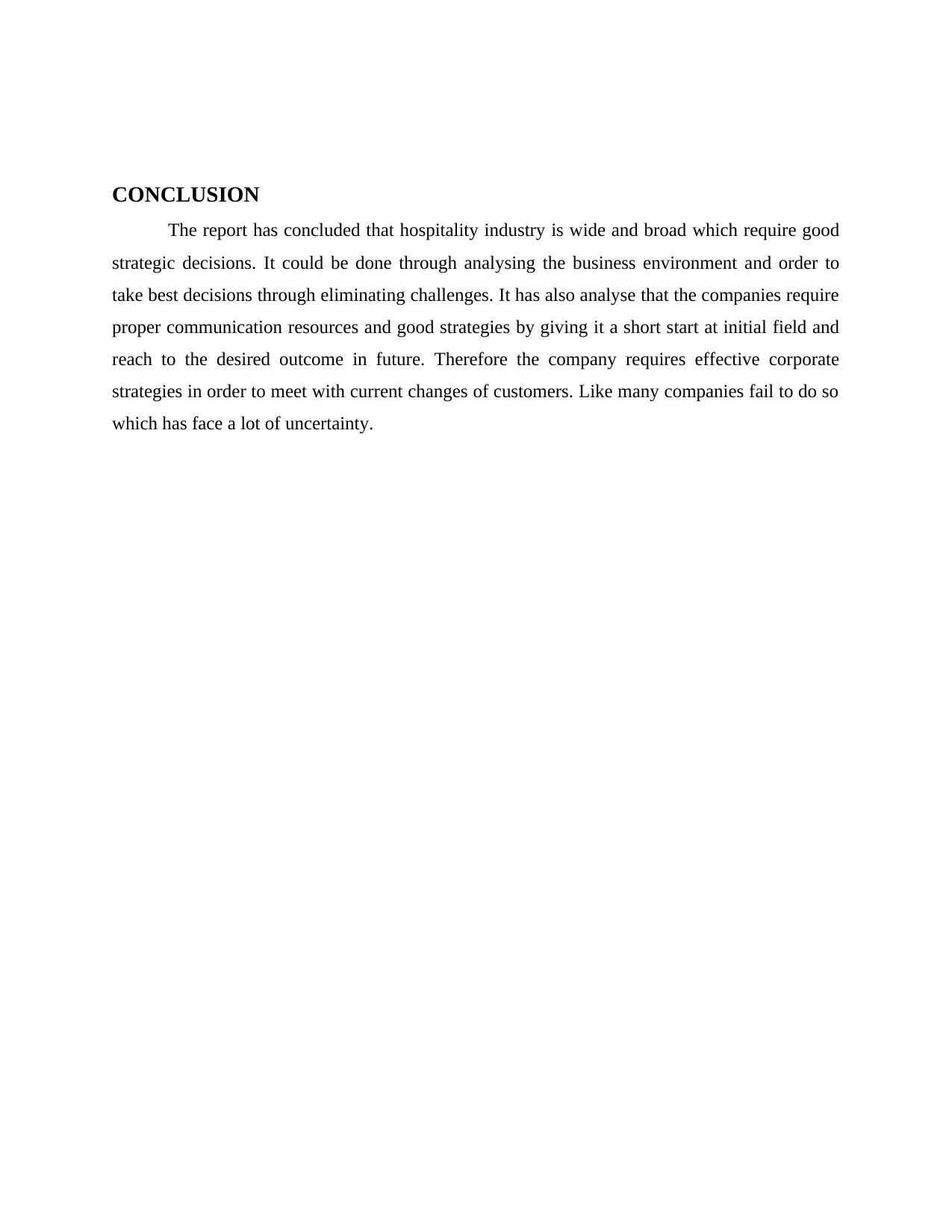
CONCLUSION
The report has concluded that hospitality industry is wide and broad which require good
strategic decisions. It could be done through analysing the business environment and order to
take best decisions through eliminating challenges. It has also analyse that the companies require
proper communication resources and good strategies by giving it a short start at initial field and
reach to the desired outcome in future. Therefore the company requires effective corporate
strategies in order to meet with current changes of customers. Like many companies fail to do so
which has face a lot of uncertainty.
The report has concluded that hospitality industry is wide and broad which require good
strategic decisions. It could be done through analysing the business environment and order to
take best decisions through eliminating challenges. It has also analyse that the companies require
proper communication resources and good strategies by giving it a short start at initial field and
reach to the desired outcome in future. Therefore the company requires effective corporate
strategies in order to meet with current changes of customers. Like many companies fail to do so
which has face a lot of uncertainty.
Paraphrase This Document
Need a fresh take? Get an instant paraphrase of this document with our AI Paraphraser
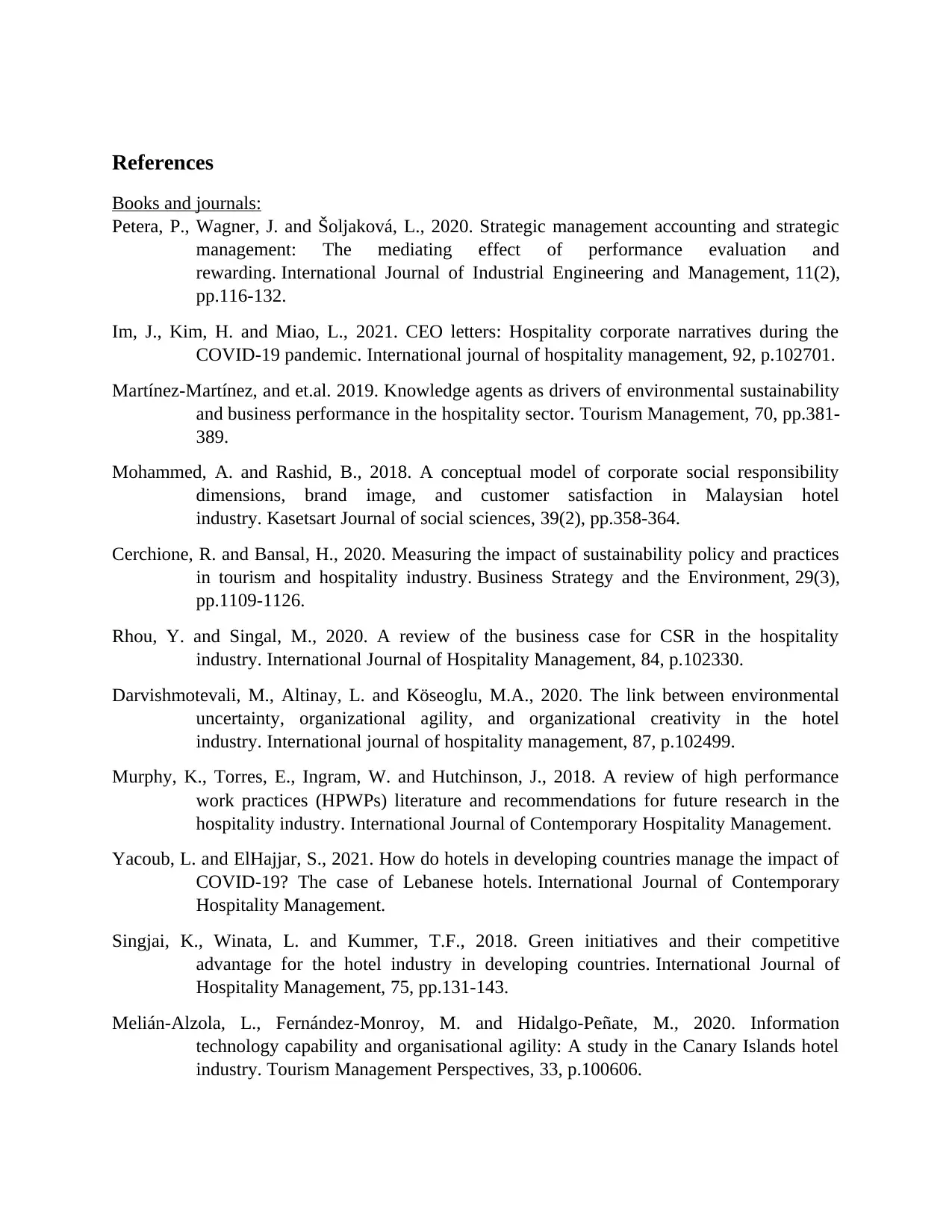
References
Books and journals:
Petera, P., Wagner, J. and Šoljaková, L., 2020. Strategic management accounting and strategic
management: The mediating effect of performance evaluation and
rewarding. International Journal of Industrial Engineering and Management, 11(2),
pp.116-132.
Im, J., Kim, H. and Miao, L., 2021. CEO letters: Hospitality corporate narratives during the
COVID-19 pandemic. International journal of hospitality management, 92, p.102701.
Martínez-Martínez, and et.al. 2019. Knowledge agents as drivers of environmental sustainability
and business performance in the hospitality sector. Tourism Management, 70, pp.381-
389.
Mohammed, A. and Rashid, B., 2018. A conceptual model of corporate social responsibility
dimensions, brand image, and customer satisfaction in Malaysian hotel
industry. Kasetsart Journal of social sciences, 39(2), pp.358-364.
Cerchione, R. and Bansal, H., 2020. Measuring the impact of sustainability policy and practices
in tourism and hospitality industry. Business Strategy and the Environment, 29(3),
pp.1109-1126.
Rhou, Y. and Singal, M., 2020. A review of the business case for CSR in the hospitality
industry. International Journal of Hospitality Management, 84, p.102330.
Darvishmotevali, M., Altinay, L. and Köseoglu, M.A., 2020. The link between environmental
uncertainty, organizational agility, and organizational creativity in the hotel
industry. International journal of hospitality management, 87, p.102499.
Murphy, K., Torres, E., Ingram, W. and Hutchinson, J., 2018. A review of high performance
work practices (HPWPs) literature and recommendations for future research in the
hospitality industry. International Journal of Contemporary Hospitality Management.
Yacoub, L. and ElHajjar, S., 2021. How do hotels in developing countries manage the impact of
COVID-19? The case of Lebanese hotels. International Journal of Contemporary
Hospitality Management.
Singjai, K., Winata, L. and Kummer, T.F., 2018. Green initiatives and their competitive
advantage for the hotel industry in developing countries. International Journal of
Hospitality Management, 75, pp.131-143.
Melián-Alzola, L., Fernández-Monroy, M. and Hidalgo-Peñate, M., 2020. Information
technology capability and organisational agility: A study in the Canary Islands hotel
industry. Tourism Management Perspectives, 33, p.100606.
Books and journals:
Petera, P., Wagner, J. and Šoljaková, L., 2020. Strategic management accounting and strategic
management: The mediating effect of performance evaluation and
rewarding. International Journal of Industrial Engineering and Management, 11(2),
pp.116-132.
Im, J., Kim, H. and Miao, L., 2021. CEO letters: Hospitality corporate narratives during the
COVID-19 pandemic. International journal of hospitality management, 92, p.102701.
Martínez-Martínez, and et.al. 2019. Knowledge agents as drivers of environmental sustainability
and business performance in the hospitality sector. Tourism Management, 70, pp.381-
389.
Mohammed, A. and Rashid, B., 2018. A conceptual model of corporate social responsibility
dimensions, brand image, and customer satisfaction in Malaysian hotel
industry. Kasetsart Journal of social sciences, 39(2), pp.358-364.
Cerchione, R. and Bansal, H., 2020. Measuring the impact of sustainability policy and practices
in tourism and hospitality industry. Business Strategy and the Environment, 29(3),
pp.1109-1126.
Rhou, Y. and Singal, M., 2020. A review of the business case for CSR in the hospitality
industry. International Journal of Hospitality Management, 84, p.102330.
Darvishmotevali, M., Altinay, L. and Köseoglu, M.A., 2020. The link between environmental
uncertainty, organizational agility, and organizational creativity in the hotel
industry. International journal of hospitality management, 87, p.102499.
Murphy, K., Torres, E., Ingram, W. and Hutchinson, J., 2018. A review of high performance
work practices (HPWPs) literature and recommendations for future research in the
hospitality industry. International Journal of Contemporary Hospitality Management.
Yacoub, L. and ElHajjar, S., 2021. How do hotels in developing countries manage the impact of
COVID-19? The case of Lebanese hotels. International Journal of Contemporary
Hospitality Management.
Singjai, K., Winata, L. and Kummer, T.F., 2018. Green initiatives and their competitive
advantage for the hotel industry in developing countries. International Journal of
Hospitality Management, 75, pp.131-143.
Melián-Alzola, L., Fernández-Monroy, M. and Hidalgo-Peñate, M., 2020. Information
technology capability and organisational agility: A study in the Canary Islands hotel
industry. Tourism Management Perspectives, 33, p.100606.
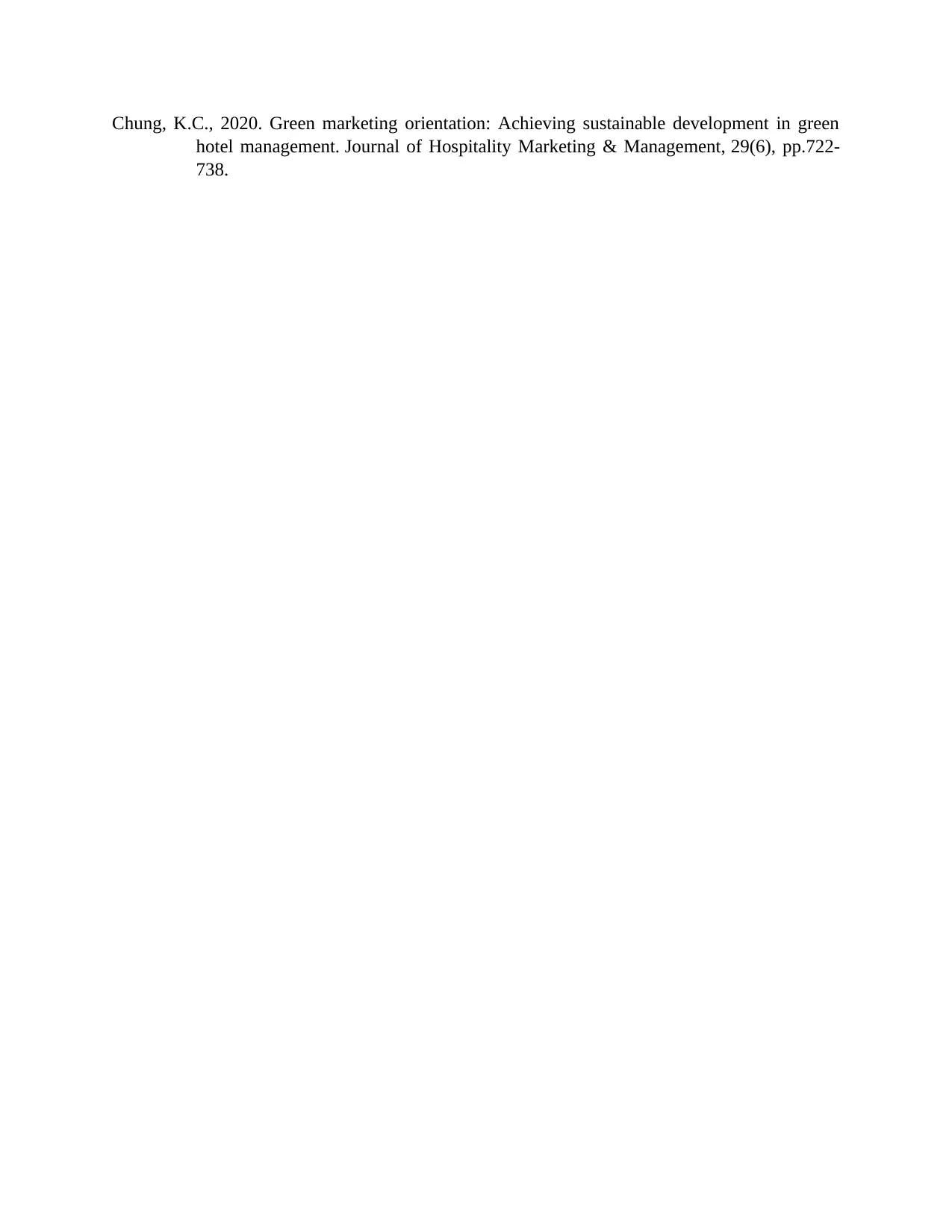
Chung, K.C., 2020. Green marketing orientation: Achieving sustainable development in green
hotel management. Journal of Hospitality Marketing & Management, 29(6), pp.722-
738.
hotel management. Journal of Hospitality Marketing & Management, 29(6), pp.722-
738.
⊘ This is a preview!⊘
Do you want full access?
Subscribe today to unlock all pages.

Trusted by 1+ million students worldwide
1 out of 12
Related Documents
Your All-in-One AI-Powered Toolkit for Academic Success.
+13062052269
info@desklib.com
Available 24*7 on WhatsApp / Email
![[object Object]](/_next/static/media/star-bottom.7253800d.svg)
Unlock your academic potential
Copyright © 2020–2025 A2Z Services. All Rights Reserved. Developed and managed by ZUCOL.



